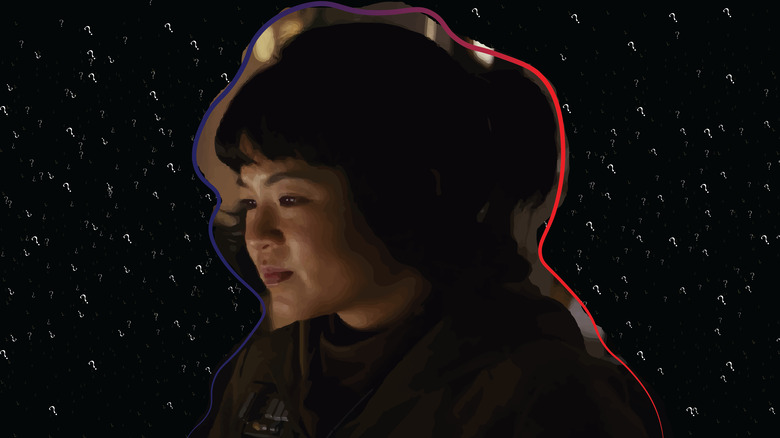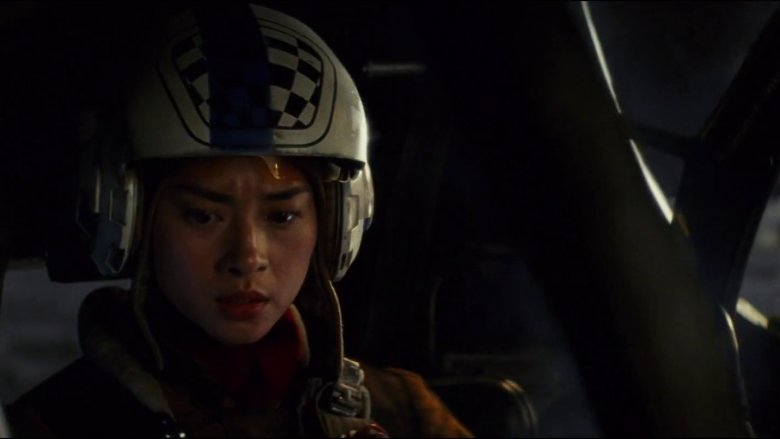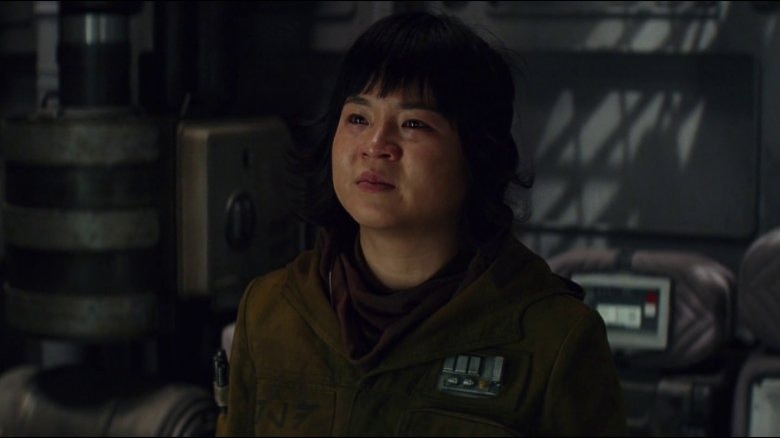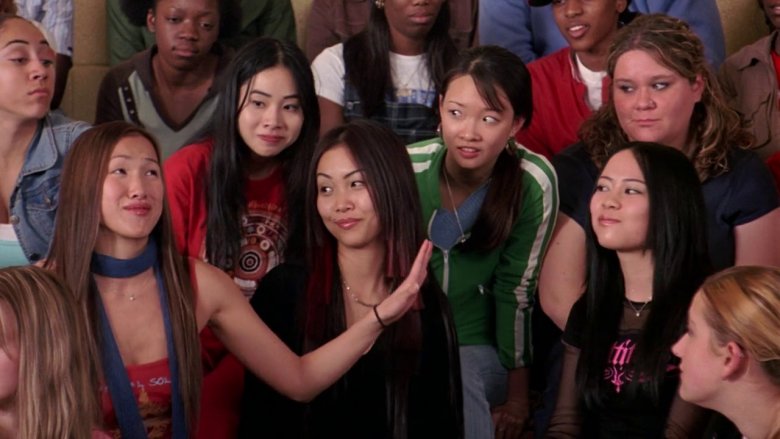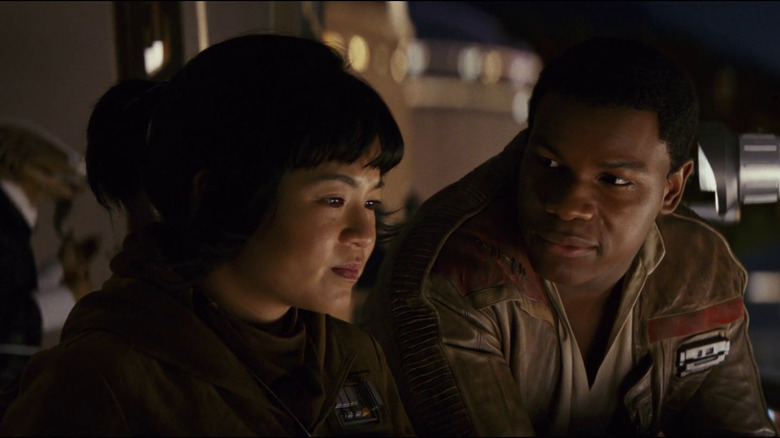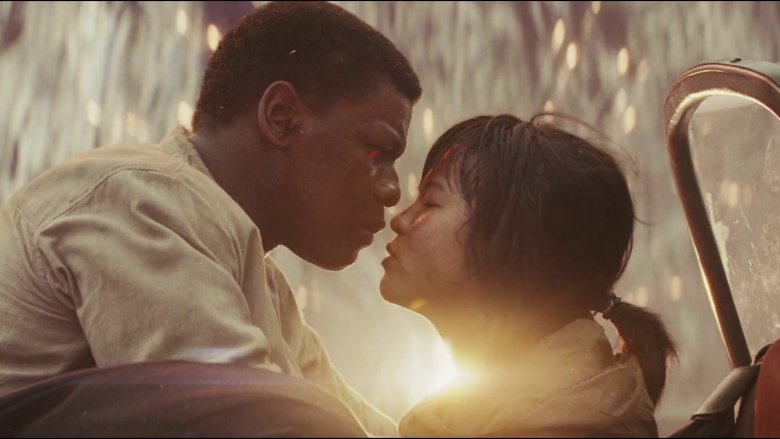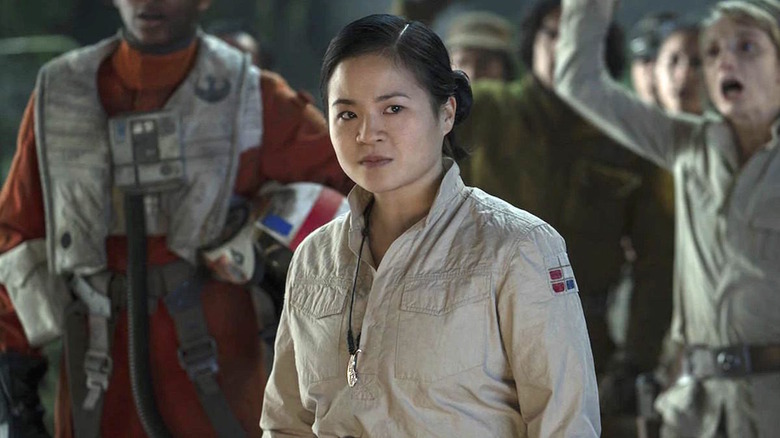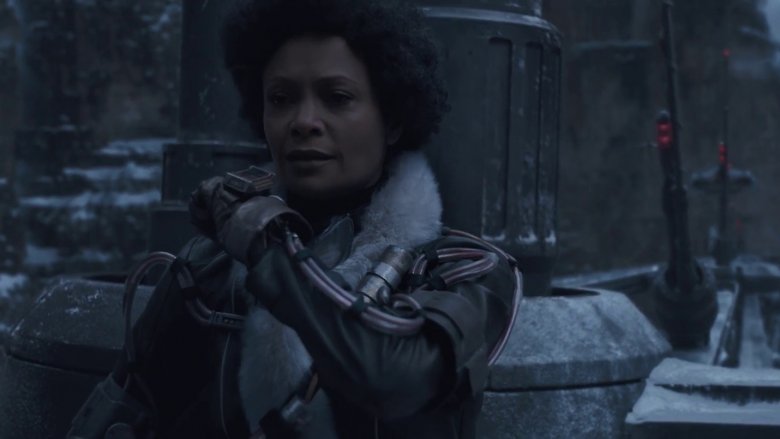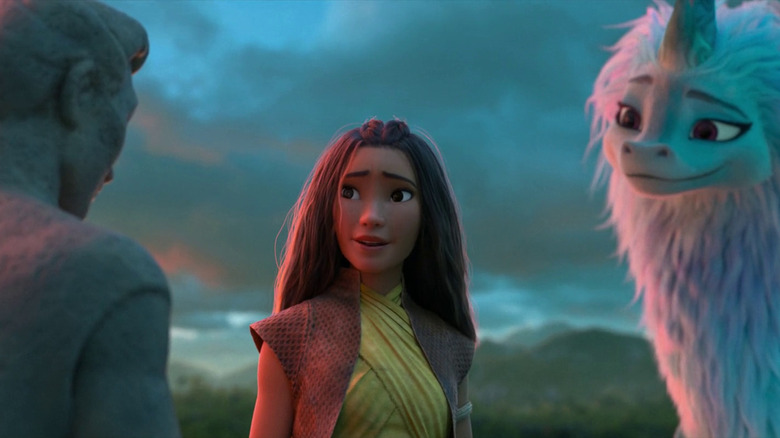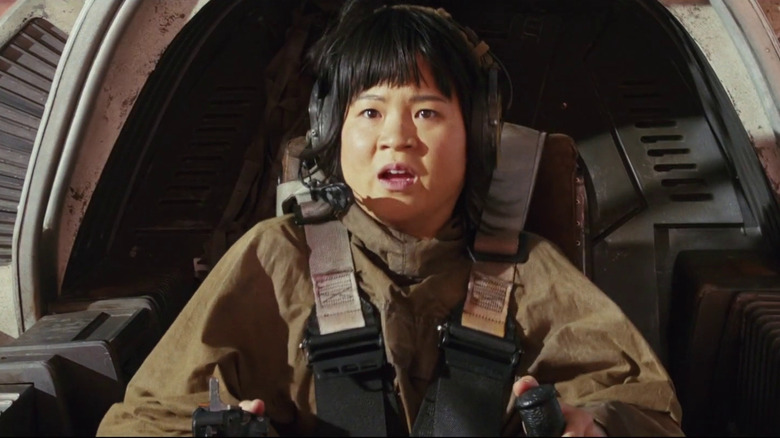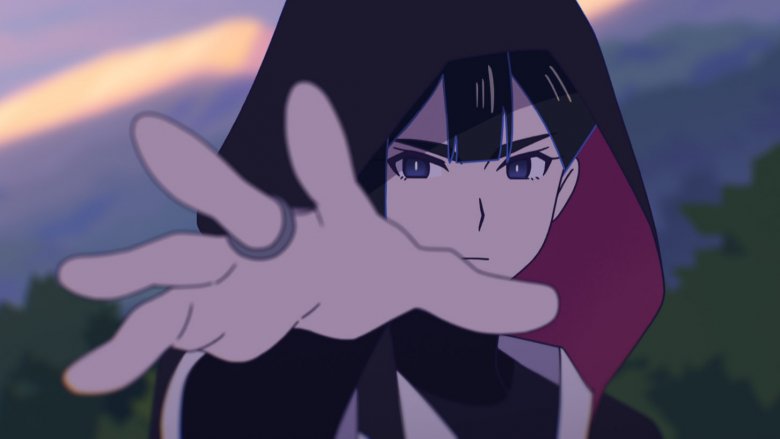How Star Wars Failed Kelly Marie Tran, And Why There's Still Hope For Vietnamese Representation
The Resistance and the First Order battle it out, continuing the big-screen war among the stars both their forebears had started in 1977. But in the opening minutes of "The Last Jedi," the eighth installment of the Skywalker Saga, writer-director Rian Johnson introduces finality. A victor shall emerge, and it won't be the good guys. Only bombers can damage the Dreadnought, and just one is left. Out of the visible crew members, a gunner, Paige, is still standing. Over comms, pilot Poe Dameron delivers a sobering truth: "It's all down to you!"
I couldn't remember the last time a Vietnamese character in "Star Wars" was given this much responsibility. In fact, I couldn't remember the last time a Vietnamese character appeared in "Star Wars."
With the introduction of Paige Tico, "The Last Jedi" would officially become the debut of my people in the galaxy far, far away, some 40 years after George Lucas first entered it into pop culture. And by saying "people," I meant actual people. Before Vietnamese became Haysians in this universe, they were indirect references or retooled concepts. The basis for the Rebels vs. Empire conflict was the war between Việt Cộng and U.S. soldiers, revealed Lucas to James Cameron in AMC's "Story of Science Fiction" show. The bear-like Ewoks of Endor were derived from Việt Cộng guerillas, whose native knowledge of the land make them the superior faction in battle, as Lucas said in the commentary track of the re-release of "Return of the Jedi." So while the character Paige Tico, played by Ngô Thanh Vân (credited as Veronica Ngo), had just two minutes and one spoken line ("Nix!"), she was a monumental upgrade.
She gave merit to the thought that Vietnam and Vietnamese could be more than a historical event.
My New Hope
Of course, Vân was not the only gift of cinematic Vietnamese representation in "The Last Jedi." A while into the adventure, through the perspective of the deprogrammed stormtrooper Finn, played by John Boyega, we meet a maintenance worker stationed on General Leia's cruiser, crying in a secluded corner. More importantly, she is gripping onto a medallion similar to Paige's. This is Paige's younger sister, Rose Tico, played by San Diego-native actress Kelly Marie Tran.
Full disclosure: I did not know who Tran was prior to this film. What even is CollegeHumor, the internet comedy company in whose skits she'd frequently appear? Still, she had me joyfully running around the house that summer of 2017, when she was announced to be a part of the cast, because I had finished processing two facts. The first: Tran would be the first Asian American in "Star Wars." The second: I read her last name as Trần, the way it was meant to be, instinctively. "Phần 'Star Wars' mới nhất có người Việt!" I remembered telling my parents and friends. Upon translation, that meant, "The next 'Star Wars' episode will have a Vietnamese!"
"But is her role big or small?" my mom asked afterward. I could not answer. I could, however, recall my earliest brushes with Vietnamese representation in Hollywood, which were all problematic in retrospect. It was gibberish and not Vietnamese that came out of Alden Pyle's mouth in the dramatic twist of 2002's "The Quiet American." "Mean Girls" in 2004 gave two girls head-scratching names like Trang "Pak" and "Sun Jin" Dinh. "Cellular," again in 2004, had a street artist who could chill you if you kept asking him to chill out. Somehow the leader of a gang called Blood Chinois in 2006's "Ultraviolet" spoke Vietnamese perfectly (which was refreshing, admittedly). "Hancock" in 2008 had only weird subtitles for the opening's Vietnamese goons — "Beat it, Soulja Boy!" or "You pay for new roof" — when they didn't say anything of the sort. And so many more. Perhaps the Force was with me then, but I felt Rose would be different from the rest. A portrayal free of issues.
I prayed for it, I think. If I had, I got it.
The (Supporting) Force Was With Her
In "The Last Jedi," Rose was a supporting character and somebody more. On the surface, she was second to Finn, meaning her actions would ultimately affect his development and his character arc. Her thwarting of Finn's escape allowed him to begin his last push to detach from the stormtrooper program. Her asking Finn to "look closer" on Canto Bight gave him more willingness to fulfill the Resistance's cause. But following that same spirit to inspect deeper, Rose, on a thematic level, was much larger than her design. In more ways than one, she was a member of the "little people" that the heroes might overlook; her perspectives, then, once voiced or acted out, gave visibility to the less visible.
Rose gave visibility to her elder sister who could no longer be present, which in turn preserved and sustained the lesson to "know right from wrong and don't run away when it gets hard." What made this even fairer was its parallel to my culture's adage Chị ngã em nâng, meaning "You fall, I catch," with "you" specifically referencing an older sister and "I" a younger sibling. No wonder why she was all smiles and commitment in her position as a deserter deterrent, far from the bustling command center up top. No wonder why she was livid when the latest runaway she had to use her stun gun on was the revered "The Finn."
She also gave visibility to the kids and the Fathiers, all of whom were captured and mistreated for entertainment on the swanky, apathetic casino planet. Whenever war is concerned, there is a fixation on casualties and budget, a need to emphasize the victory gained (otherwise to minimize the defeat experienced). The rest? Collateral damage, given lesser or zero care. Rose didn't let that happen on her watch, highlighting how the enduring fight between Rebels and Empires would always leave some sort of destruction, in this case the innocence of the young and the existence of nature. Children and ecology — always affected by wars, yet not-as-discussed on the regular. Rose's "look closer" prompted me to think about how my country has always been viewed, especially to brand-new visitors. They tend to see the fun things that we have — our dishes, peoples and sights — and look away at our past. It would be news whenever leftover, undetonated munitions in the local hills, forests and grounds you could drive through, trek on, or take pictures of are discovered. Good versus evil, albeit necessary, is calamitous. Here, Rose was the one cognizant enough to realize that, a rarity in a series that, to be frank, has been revered for its spectacle more than its subtexts.
As a result, Rose's line to Finn in the Battle of Crait, "That's how we're gonna win: Not fighting what we hate — saving what we love," struck a special chord. Of late, I, along with fellow-minded Vietnamese, have been warring against active spreaders of misinformation about the pandemic and regulations in the community. Rose's quote, its origins traceable to "The Empire Strikes Back" director Irvin Kershner, in more ways than one informed me how to best curb their influence. Do I call out a liar by highlighting the facts they miss, or craft a few lies myself? Like Finn, do I fly into the siege cannon to become the battle fodder the First Order had intended — or foment a better strategy next time, potentially with improved tools and besides extra allies? Sometimes the desirable result wouldn't come from leaving yourself out of the equation. Sometimes a person's blaze of glory would serve few in a situation concerning many. Rose flying her ski speeder into Finn wasn't her first intervention of his reckless actions, but it was the most important and profound. To beat whomever you wanted to, becoming them would give you no power.
In short, Rose was "The Support" of the supporting ensemble.
Attack of the Status Quo
Not everyone felt the same about her, however. Fair. Less fair, however, was that much of the dislike was most unkind and uncivilized. Search the name Rose Tico on Google or YouTube, and the top searches would reveal a running theme that she, and by extension Tran, had done the most appalling things to "Star Wars." Ruining the franchise. Creating the worst scene. Becoming the darkest side. Being the most cringe — or, in more casual terms, the worst. In video forms, these opinions could go on for half an hour or longer, often titled in all caps and with a convoy of exclamation marks.
All parties must end, yet I felt the one for the Vietnamese presence in "Star Wars" was too short-lived. Not long after I bookmarked a tweet of Tran crying tears of joy at "The Last Jedi" premiere, comments on her weight and looks started to appear. Or they intensified; they were already there from her casting announcement. It was an emotional whiplash to read about the rancid vandalism on her Wookieepedia page after watching an Instagram video of her, incognito in a coffee shop, hearing people praising Rose. Then, the disappearance of her Instagram, along with that affirming video. Then, the New York Times essay, as powerful as it was heartbreaking. Then, the most confounding thing: a reduced screen time in the follow-up and closer to the trilogy, 2019's The Rise of Skywalker.
As confounding as Palpatine's return was, somehow, Rose would resist the call of adventure. "Last chance, Rose," Finn said, and her reply was to stay back at base to help Leia. Although an important role, she was only given one minute on screen, nine less than her previous outing. A new minor character was also introduced — one Beaumont Kin, played by Dominic Monaghan — yet it didn't take long to notice he held the same functions as her and, somehow, more emphasis than her. Was he her replacement? In explaining the lack of Rose, co-writer Chris Terrio cited unsatisfying CGI of the late Carrie Fisher, not addressing the popular internet theory that they were placating to the faction that has successfully minimized her. Whatever the case, the reality was, and still is: a character who previously broke boundaries had a new one in the way.
Back to the margins, again. Or was that the plan all along, as a hushed fact? It was hard to not wonder about this when, alongside Tran, Boyega had voiced a bevy of disconcerting experiences during the making of "Star Wars." "You knew what to do with these other people," he said, referring to the handling of Daisy Ridley's Rey and Adam Driver's Kylo in "The Rise of Skywalker," "but when it came to Kelly Marie Tran, when it came to John Boyega, you know f*** all." He also felt Oscar Isaac and Naomi Ackie had their own on-set tales.
Most worrisome, however, was this issue existing beyond the main films. Thandiwe Newton, who in the 2018 prequel film "Solo" played the smuggler Val, also felt wronged by the mega-franchise. Her character was killed when the script didn't call for it. She and Val together formed the debut of a Black woman in George Lucas' expanding space.
"Like, are you f***ing joking?" she said of Val's arc.
What Shall Awaken?
I'm still in the reality where it is easy to share tales about my community's presence in Hollywood but not finding any fulfillment. In these tales, the subject's fall always succeeds their rise, many times more immediate than usual. Alternatively, the subject stays small throughout. It can be tiring, trying to explain that major recognition for a Vietnamese in the film industry, or any creative one, is as real as it is illusory. As worthwhile as it is hazardous.
However, despite the markers of a cautionary tale in Tran's "Star Wars" story, I don't want it to be read like that. Especially when, nowadays, a shift in the industry is detectable — one allowing my people's appearances on screen to be less of a rarity. If not people, then it's locales or practices I know of or identify with. Without this change, "Raya and the Last Dragon" wouldn't have been made. While the film's world was an amalgam of Southeast Asian countries, at the fore was Vietnam, with Qui Nguyen as one of the co-writers, and Tran herself voicing our dark-skinned heroine. Considering the history of Vietnamese portrayal in films, I never thought a project like this would ever be thought of, let alone coming to fruition.
We can be more, much more than a franchise that struggles to believe it can grow beyond the last name Skywalker. Creative talents with Vietnamese heritage are actually everywhere, more than I could have ever imagined or been made to believe. They are seeds waiting for the rain to sprout, but there are gears in place delaying the moment of rainfall. These gears are also the same ones not noticing the Vietnamese dramedy "Bố Già" made waves at the special box-office, or that two short films selected for Sundance 2021 were from Julian Doan and Phạm Ngọc Lân. Or how influential Vietnamese elements were in the stories of recent productions like "Da 5 Bloods" and "Blue Bayou," however imperfect. Or, if we're keeping things "Star Wars"-related, there are people who truly love Rose — as evident through online campaigns like #RallyForRose, #JusticeForRose, or the custom saber-related #RiseforRose — and believe she deserves better.
In Star Wars, A Place for Us
This is the first time I could complete a write-up on Kelly Marie Tran and "Star Wars." A few years late, but only now do I see everything that transpired and connected with more clarity. At first, my words were too positive amid the depressing reality. Afterward, I was so deep into the latter, what I had written had no hope. This piece is where it is now because I have found a spark. To be rejected from "Star Wars," one of pop culture's biggest names, is a lasting kind of hurt, but the ordeal shows there is always room to bloom. Try as the unsavory, and very real, figures of this fictional world might to prove the opposite, there will always be room. Endlessness is why imagination is so beautiful. Case in point: the Japanese-centric "Star Wars Visions," or even the nods to the Māori roots of "The Book of Boba Fett" star Temuera Morrison. It was, for the first time, a project where people whose elements were borrowed to tell stories get to be the storytellers.
And so, may the heroes and villains of "Star Wars" keep finding new bones to pick. The more often this happens, the better the chance I can see my people flying X-wings, brandishing lightsabers — do quintessentially "Star Wars" things. Jon M. Chu, I hope, is still open to do a series based on Rose Tico. As writer Elizabeth E. Wein's "Cobalt Squadron" could show, Rose is as fleshed-out a character as can be. More of her wisdom will only brighten the stars.
It's good to have more stories of Vietnamese sightings in popular media. To store and to tell. Most importantly, to share. It shouldn't be a far, far away thing, this wish that we can have a place in the cinematic constellation.
